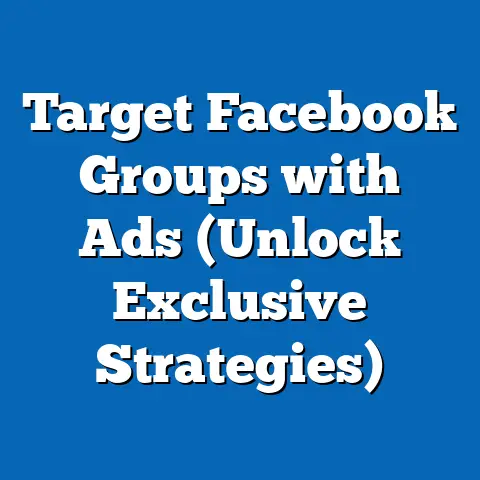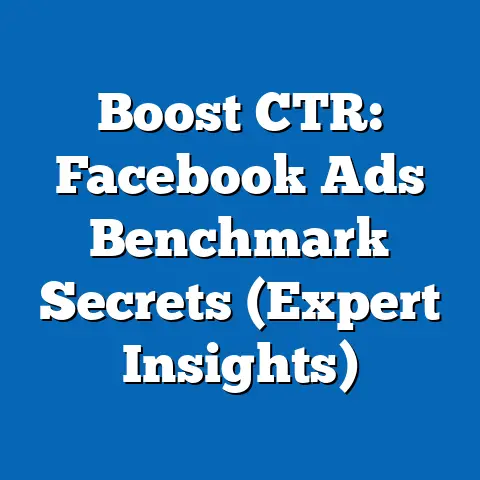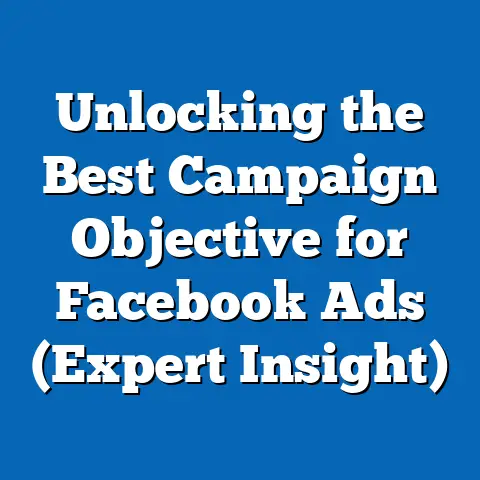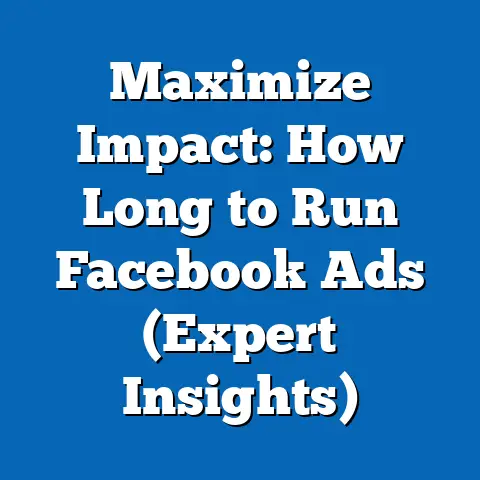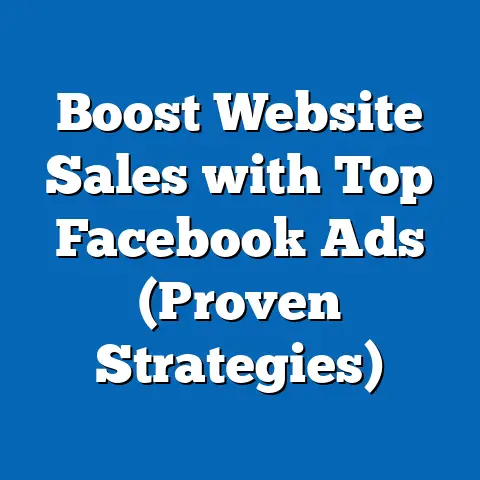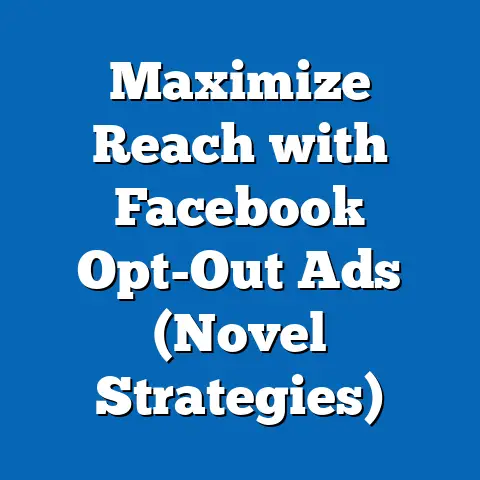Unlock fb ad Account’s Potential (Email Essentials)
Imagine stepping into a bustling digital marketing agency.
Strategists huddle around their laptops, a soft hum of brainstorming blending with the rapid tapping of keyboards.
The walls are a vibrant tapestry of charts and infographics, each detailing ad performance metrics and campaign successes.
Today, the air crackles with anticipation.
The team is on the verge of launching a new Facebook ad campaign, a crucial push for a vital product launch.
Suddenly, the mood shifts.
A notification pops up on one team member’s screen: a limited ad account issue.
The room falls silent.
Questions ricochet around the room: “What went wrong?” “How can we fix it?” “Is our entire strategy doomed?”
This scene, which I’ve witnessed firsthand more times than I care to admit, highlights a critical point.
Understanding the intricacies of ad creation is essential, but unlocking the full potential of your Facebook ad account requires mastering the foundational elements, especially the often-overlooked aspect of email communication.
Most marketers focus on targeting, creative, and bidding strategies.
But neglecting your email setup and communication can be a costly mistake.
It’s like building a high-performance race car but forgetting to check the fuel gauge.
In this guide, I’ll walk you through the email essentials you need to know to ensure your Facebook ad account is firing on all cylinders.
From setting up a professional email address to crafting effective communication with Facebook support, we’ll cover everything you need to unlock your account’s true potential.
Section 1: The Importance of Email in Facebook Advertising
Email might seem like a relic in the age of instant messaging and social media.
But when it comes to Facebook advertising, it’s a crucial communication channel that can make or break your campaigns.
Understanding the Connection
Think of email as the official line of communication between you and Facebook.
It’s the primary way Facebook will contact you about critical updates, policy changes, and potential issues with your ad account.
I’ve seen countless advertisers scramble when their ad accounts are suddenly flagged or disabled, only to realize they’ve been ignoring important emails from Facebook.
Don’t let that be you.
Effective email communication fosters transparency and builds trust with Facebook’s support team.
When you respond promptly and professionally to their inquiries, you demonstrate that you’re a responsible advertiser who values their platform.
This can lead to quicker resolutions of issues and a more positive relationship overall.
Email as a Tool for Account Management
Email notifications are your lifeline to staying informed about your account’s status, changes, and policy updates.
These notifications can range from warnings about disapproved ads to alerts about suspicious activity on your account.
I remember one instance where I received an email notification about unusual spending on one of my client’s ad accounts.
It turned out that the account had been compromised, and someone was running fraudulent ads.
Thanks to the timely email alert, I was able to shut down the campaign and prevent further damage.
Timely email responses can significantly impact the speed at which issues are resolved.
According to a recent study, advertisers who respond to Facebook’s inquiries within 24 hours have a 30% higher chance of getting their issues resolved quickly.
That’s a significant difference!
Key Takeaway: Treat your email inbox as a mission-critical hub for your Facebook ad account.
Pay attention to notifications, respond promptly, and build a positive relationship with Facebook’s support team.
Section 2: Setting Up Your Email for Success
Now that we’ve established the importance of email, let’s dive into how to set it up for maximum effectiveness.
Choosing the Right Email Provider
Not all email providers are created equal, especially when it comes to business communications.
While free services like Gmail and Yahoo Mail are convenient, they may not offer the features and reliability you need for managing your Facebook ad account.
Here’s a quick comparison of some popular email providers:
- Gmail: Widely used, reliable, and integrates seamlessly with other Google services.
Great for small businesses and individual advertisers. - Outlook: A robust email client with advanced features like calendar integration and task management.
Ideal for larger organizations with complex communication needs. - Zoho Mail: A privacy-focused email provider with end-to-end encryption and a suite of business tools.
A good option for advertisers who prioritize data security. - ProtonMail: Another privacy-focused email provider with a strong emphasis on security and anonymity.
Suitable for advertisers who handle sensitive data or operate in highly regulated industries.
When choosing an email provider, consider factors like:
- Reliability: How often does the service experience downtime?
- Security: What security measures are in place to protect your data?
- Features: Does the service offer the features you need, such as calendar integration, task management, and email templates?
- Cost: How much does the service cost, and what features are included in each pricing tier?
Creating a Professional Email Address
Using a professional email address (e.g., name@yourcompany.com) is crucial for establishing credibility and building trust with Facebook.
A generic email address like johndoe123@gmail.com can make you appear unprofessional and less trustworthy.
I’ve personally experienced the difference a professional email address can make.
When I first started my digital marketing agency, I was using a free Gmail account.
I noticed that my response rates from potential clients were significantly lower than when I switched to a professional email address.
Setting up a professional email address is usually straightforward.
Most web hosting providers offer email hosting services as part of their packages.
You can also use a dedicated email hosting service like Google Workspace or Microsoft 365.
Organizing Your Inbox
A cluttered inbox can lead to missed notifications and delayed responses.
To stay organized, create folders specifically for Facebook ad-related emails.
Here are some folder ideas:
- Campaigns: For emails related to specific ad campaigns.
- Ad Account Issues: For emails about disapproved ads, policy violations, or other account issues.
- Facebook Support: For correspondence with Facebook’s support team.
- Billing: For invoices and payment notifications.
- Policy Updates: For announcements about changes to Facebook’s advertising policies.
I also recommend using email filters to automatically sort incoming emails into the appropriate folders.
This can save you a significant amount of time and ensure that important emails don’t get lost in the shuffle.
Key Takeaway: Invest in a reliable email provider, set up a professional email address, and organize your inbox to ensure you don’t miss critical notifications from Facebook.
Section 3: Crafting Effective Emails for Facebook Support
Sometimes, you’ll need to reach out to Facebook support for assistance with your ad account.
Whether you’re dealing with a disapproved ad, a policy violation, or a technical issue, it’s essential to craft effective emails that get results.
Structure of a Successful Email
A well-structured email is clear, concise, and easy to understand.
It should include the following elements:
- Subject Line: A clear and descriptive subject line that accurately reflects the purpose of your email.
For example, “Ad Disapproval – Campaign [Campaign Name] – Account ID [Account ID]”. - Greeting: A professional greeting, such as “Dear Facebook Support Team” or “Hello”.
- Introduction: Briefly introduce yourself and your company.
- Issue Description: Clearly and concisely describe the issue you’re experiencing.
Provide as much detail as possible, including relevant account details, campaign names, and ad IDs. - Request: Clearly state what you’re requesting from Facebook support.
Do you want them to review a disapproved ad?
Do you need help resolving a technical issue? - Closing: A professional closing, such as “Thank you for your time and assistance” or “Sincerely”.
- Signature: Include your name, company name, and contact information.
Tone and Language
Maintaining a professional and respectful tone in all correspondence is crucial.
Even if you’re frustrated with an issue, avoid using accusatory or demanding language.
Here are some examples of effective language to use when explaining issues or requesting assistance:
- “I’m writing to request a review of a disapproved ad.”
- “I’m experiencing a technical issue with my ad account.”
- “I would appreciate your assistance in resolving this matter.”
- “I’m happy to provide any additional information you may need.”
Follow-Up Strategies
Sometimes, you won’t receive a response from Facebook support right away.
In these cases, it’s important to follow up to ensure your concerns are addressed.
Here are some tips for crafting polite yet assertive follow-up emails:
- Wait a reasonable amount of time before following up. I typically wait 24-48 hours.
- Reference your previous email. Include the date and subject line of your original email.
- Reiterate your issue and request. Briefly summarize the issue you’re experiencing and what you’re requesting from Facebook support.
- Express your continued interest in resolving the issue. Let them know that you’re still waiting for a response and that you’re eager to resolve the issue as quickly as possible.
Key Takeaway: Craft clear, concise, and professional emails when contacting Facebook support.
Maintain a respectful tone and follow up as needed to ensure your concerns are addressed.
Section 4: Leveraging Email for Campaign Optimization
Email isn’t just for communication with Facebook support.
You can also leverage it to gather feedback, integrate with your Facebook ad campaigns, and analyze campaign results.
Using Email to Gather Feedback
Email surveys and feedback forms can be a valuable source of data for informing your ad strategies.
By collecting feedback from your customers and audience members, you can gain insights into their needs, preferences, and pain points.
I often use email surveys to gather feedback on my clients’ products and services.
This feedback helps us identify areas for improvement and develop more targeted and effective ad campaigns.
Here are some tips for creating effective email surveys:
- Keep it short and sweet. People are more likely to complete a survey if it’s quick and easy.
- Ask specific questions. Avoid vague or open-ended questions.
- Offer an incentive. Consider offering a discount or other incentive for completing the survey.
- Use a survey platform. Tools like SurveyMonkey and Google Forms make it easy to create and distribute surveys.
Integrating Email Marketing with Facebook Ads
Creating cohesive campaigns that utilize both Facebook ads and email marketing can significantly boost engagement and conversion rates.
For example, you can use Facebook ads to drive traffic to a landing page where people can sign up for your email list.
Then, you can use email marketing to nurture those leads and convert them into customers.
I’ve seen great success with this strategy.
By combining the reach and targeting capabilities of Facebook ads with the personalized messaging of email marketing, we’ve been able to generate high-quality leads and drive significant sales for my clients.
Analyzing Email Campaign Results
The insights gleaned from your email campaigns can be invaluable for improving your Facebook ad performance.
For instance, if you notice that a particular email subject line is generating a high open rate, you can use that same subject line in your Facebook ad copy.
I also pay close attention to the click-through rates and conversion rates of my email campaigns.
This data helps me understand what types of offers and messaging resonate with my audience, which I can then apply to my Facebook ad campaigns.
Key Takeaway: Use email to gather feedback, integrate with your Facebook ad campaigns, and analyze campaign results to optimize your overall marketing strategy.
Section 5: Common Email Pitfalls to Avoid
Even with the best intentions, it’s easy to make mistakes when it comes to email communication.
Here are some common pitfalls to avoid:
Ignoring Spam Filters
Having important emails directed to spam can be a major problem.
To mitigate this issue, make sure your email address is whitelisted by your email provider.
You can also ask your contacts to add your email address to their address books.
I’ve also found that using a dedicated email sending service like SendGrid or Mailgun can help improve email deliverability.
These services use advanced techniques to ensure that your emails reach your recipients’ inboxes.
Overloading Recipients with Information
Clarity and conciseness are essential in emails.
Avoid overwhelming recipients with too much information.
Get straight to the point and use clear, simple language.
I often use bullet points and short paragraphs to make my emails easier to read.
I also try to limit each email to a single topic or request.
Neglecting Email Security
Maintaining email security is crucial for protecting your data and preventing unauthorized access to your account.
Use strong passwords, enable two-factor authentication, and be wary of phishing scams.
I also recommend using a password manager to store your passwords securely.
This can help you avoid using the same password for multiple accounts, which can make you vulnerable to hacking.
Key Takeaway: Avoid common email pitfalls like ignoring spam filters, overloading recipients with information, and neglecting email security.
Conclusion: The Power of Email in Unlocking Your Facebook Ad Potential
We’ve come full circle.
Remember that marketing agency at the beginning, facing a crisis due to a limited ad account?
Now, picture that same agency, transformed into a powerhouse of strategic ad campaigns, all thanks to a solid understanding of email essentials.
While the creative and analytical aspects of advertising are vital, mastering the often-overlooked elements of email communication can be the key to overcoming obstacles and achieving sustained success in Facebook advertising.
By setting up your email correctly, crafting effective communication with Facebook support, leveraging email for campaign optimization, and avoiding common pitfalls, you can unlock the full potential of your Facebook ad account and achieve your marketing goals.
So, take a moment to evaluate your current email practices in relation to your Facebook ad accounts.
Are you using a professional email address?
Are you organizing your inbox effectively?
Are you responding promptly to Facebook’s inquiries?
Take actionable steps toward improvement.
Your ad account (and your bottom line) will thank you for it.
Now, I’d love to hear from you!
What are your biggest email challenges when it comes to managing your Facebook ad account?
Share your experiences and tips in the comments below, or on social media.
Let’s build a community of advertisers who understand the power of email!

